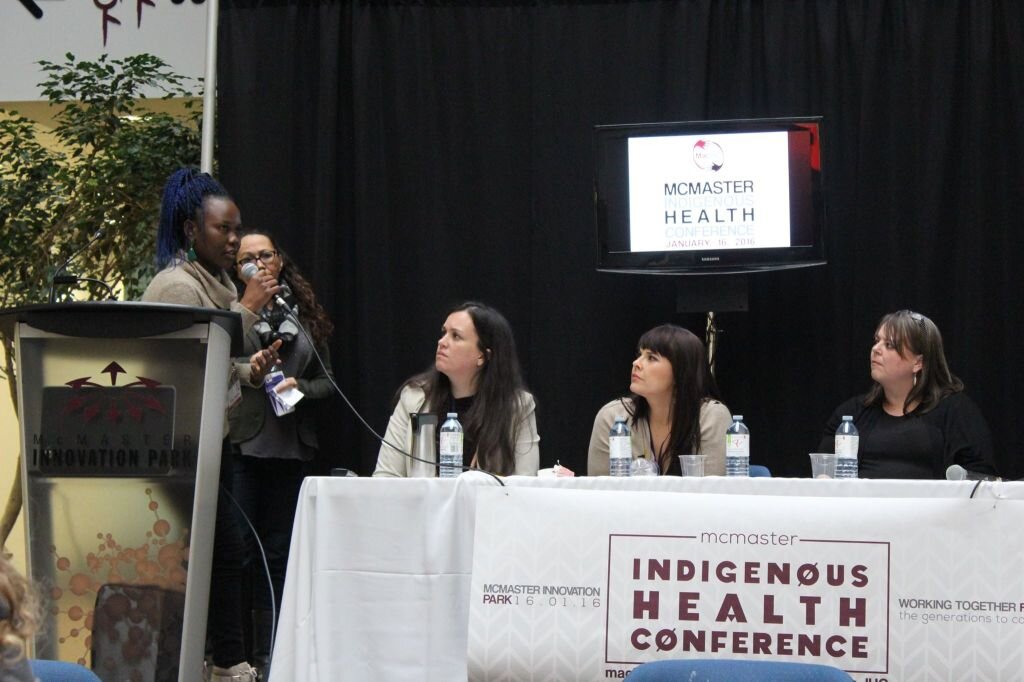McMaster Indigenous Health Conference 2016: We Are All Implicated
With the release of the Truth and Reconciliation Commission Report, and increasing advocacy for the incorporation of indigenous history/knowledge into medical and post-secondary education, it was both topical and imperative for McMaster University to host its first Indigenous Health Conference this year. The theme, Working together for the generations to come, was reflected in the involvement of local Aboriginal groups and speakers.
The strongest feature of McMaster Indigenous Health Conference (MIH), was its acknowledgement of the following premise in advancing aboriginal health and welfare: indigenous peoples are culturally, historically, and fundamentally distinct and heterogeneous. The path towards self-determination, and personalized healthcare, for Aboriginal communities in Canada, is rooted in difference – in accepting the myriad ways of knowing, being, and healing as legitimate. Here are some highlights:
The opening keynote was delivered by Lisa Monkman, an Anishinaabe doctor from Manitoba who candidly spoke about her life growing up in Winnipeg, known as the most racist city in Canada. She spoke about her struggle against racism in school, and coming to terms with her identity despite the constant “shame and embarrassment” her classmates compelled her to feel. She shared a poignant story about how her principal, teachers, and mother experimented with “harm-reduction” within her school. They eliminated activities that were exclusionary, such as “picking teams”, so that she would feel more accepted. And, after a year, she did. Dr. Monkman ended her keynote address by singing a beautiful song, with an aboriginal drum in hand.
The conference also gave a platform to women from the Six Nations community to speak about their experiences navigating a racist and fragmented healthcare system. They spoke with passion and great courage to tell their stories, and cited a staple of indigenous life: the family as a source of generational support. A recurring issue was chemotherapy; particularly regarding the right to choose between chemotherapy and traditional medicine, or both (see: the case of Makayla Sault). The panel, both emotional and anecdotal, provided a perspective rooted in lived experiences and was not simply a cursory mention of aboriginal medicine. This is a discussion that healthcare practitioners need to have within the broader discourse of indigenous health in Canada.
Concurrent breakout sessions discussed the historical/distal determinants, and the proximal determinants of health. The session on Poverty and Settler-Colonialism, by McMaster Sociology Professor Jeffrey Denis, addressed the social determinants of health and indigenous attributions of health, such as Mino-bimaadiziwin, known as the pursuit for “the good life”. The second session, ‘Integrating Models of Care’ by the Six Nations Birthing Centre, consisted of a panel of midwives. Compared to registered midwives under the jurisdiction of the College of Midwives of Ontario, aboriginal midwifery has a traditional, native component that allows for ceremonies and traditional medicines (that 90% of their clients use), while still following certain guidelines by the College of Midwives. The church had traditionally shunned aboriginal medicine, associating it with witchcraft. The remnants of this culture of antagonism against aboriginal women persist in certain local hospitals today. The midwives of the Birthing Centre not only provide personalized care, but also accompany women to hospitals as advocates and explain certain clinical decisions. The legacy of residential schools also lingers: aboriginal children never had the chance to observe child-rearing practices from their parents/grandparents, and were told that “just formula” was okay instead of breastfeeding. So it may come as a surprise that women can, in fact, feel empowered through breastfeeding, as it can serve as a tool to overcome intergenerational trauma.
In response to the Toronto Public Health Report having no content on indigenous peoples’ health, Dr. Billie Allan, the second keynote, worked with Janet Smylie to publish the First Peoples, Second Class Treatment report on racism against aboriginals in healthcare. She directly spoke to the culture of racism and misunderstanding in the Canadian healthcare and welfare system. Racism, according to Dr. Allan, “impacts every facet of our lives… and has had a gendered impact” on aboriginal populations. This is such a prevalent aspect that permeates every day of indigenous peoples’ lives, that Dr. Allan doesn’t take her children to the doctor or school by herself because blatant discrimination and microaggressions continue to exist. Child welfare programs controlled by aboriginal groups, and aboriginal midwifery programs, are born out of a healthcare system that is entrenched in racism and ill equipped to meet the needs of indigenous peoples. Institutions that are meant to be sources of legitimate support are instead alienating, and systematically contribute to social conditions that bolster unacceptable health outcomes compounded by poverty.
Billie Allan asks us to act by commission, rather than omission. She asks us to “help tell a different story”, to change the narrative that is told in classrooms and in newsrooms. For Dr. Allan, simply using “politically correct words” opportunistically to “prevent [oneself] from being labeled a racist” is not enough; all Canadians have a stake in Aboriginal issues and the ongoing reconciliation process.
Personally, the McMaster Indigenous Health Conference ultimately left me with a sense of responsibility to help make space for Indigenous knowledge and healing, especially as a member of the non-indigenous diasporic settler community. Aboriginal peoples welcome us with open arms. They encourage us to be involved and listen to their stories, not to walk into their communities and garnish the many indigenous narratives with a victimizing version that fits our own.

